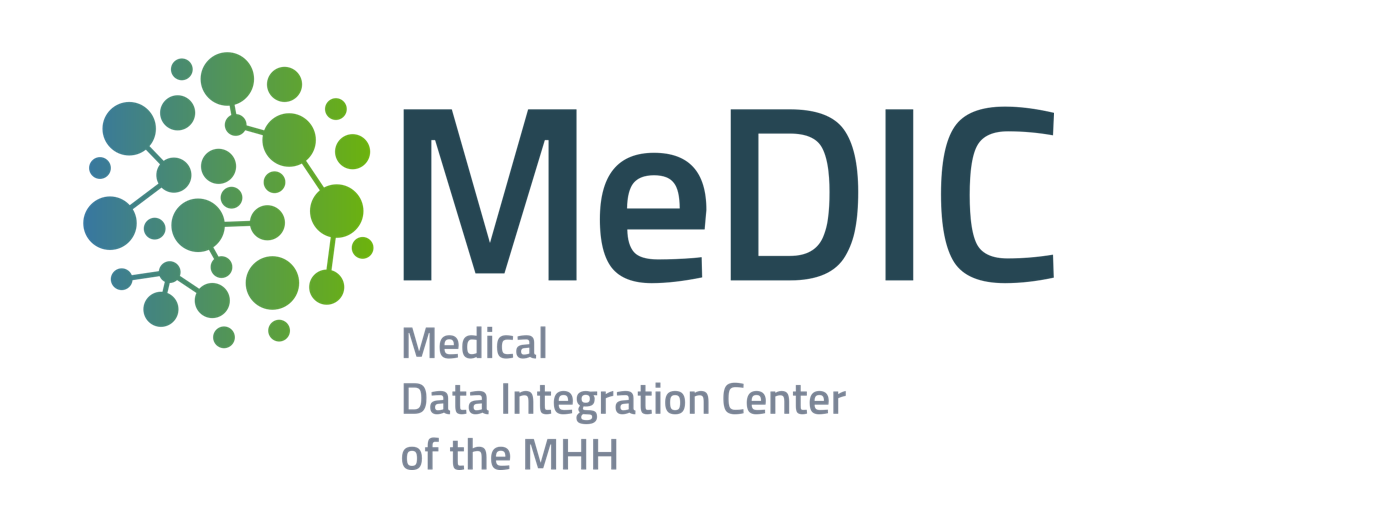The Medical Data Integration Center of the MHH

The Medical Data Integration Center (MeDIC) of the Hannover Medical School was established within the framework of the Medical Informatics Initiative (MII) as part of the HiGHmed consortium.
The MeDIC of the MHH is involved in numerous large-scale projects and cooperates with other university hospitals, the German Cancer Research Center and other partners from healthcare, science and industry. The focus of the work is on the development, provision and exchange of structured data for research purposes.
The MeDIC of the MHH is mainly funded by the Federal Ministry of Research, Technology and Space (BMFTR) and is part of the Network of University Medicine (NUM) and the Medical Informatics Initiative (MII).
Aims
Primary aim of the MeDIC is the structured integration of different data sources (medical reports, laboratory data, x-rays, gene sequencing data, etc.) within the MHH. Various institutes and departments of the MHH cooperate with each other.
The overarching goal is to expand and consolidate the infrastructure already established between the university hospitals in the coming years in order to further strengthen and promote the cross-institutional exchange of medical data. This will be achieved through open, interoperable and standardised data definitions in order to realise a sustainable development of software applications.
Of course, data protection, data security and the informational self-determination of patients are of central importance for the exchange of data.
The new possibilities for the cross-institutional exchange of medical data should improve patient care and also intensify the transfer between medical research and health care.
Clinical Use Cases
The following four clinical use cases will be used to demonstrate the expected added value of structured collection and cross-institutional exchange of medical data for health care and research.
Research
Research also benefits directly from the possibilities of exchanging data across institutions. On the one hand, information about similar cases can contribute to successful treatment. On the other hand, it will be possible to obtain a reliable number of cases for very rare diseases for statistical analyses and to gain new insights into the causes and course of diseases.
Cooperating institutes and departments
at the MHH
- Peter L. Reichertz Institute for Medical Informatics of TU Braunschweig and Hannover Medical School (PLRI)
- MHH Information Technology (MIT)
- Department of Cardiology and Angiology
- Institute of Medical Microbiology and Hospital Epidemiology
- Department of Gastroenterology, Hepatology, Infectious Diseases and Endocrinology
- Institute for Diagnostic and Interventional Radiology
- Institute of Human Genetics
- Institute for Radiation Therapy and Special Oncology
- Comprehensive Cancer Center (CCC) Hannover
- Center for Clinical Trials
- Clinic for Pediatric Pneumology, Allergology and Neonatology
- and others
Publications
- Marschollek M, Marquet M, Reinoso Schiller N et al. Automatisierte Surveillance und Risikovorhersage mit dem Ziel einer risikostratifizierten Infektionskontrolle und -prävention (RISK Prediction for Risk-stratified Infection Control and Prevention). Bundesgesundheitsbl 67, 685–692 (2024). doi: 10.1007/s00103-024-03882-w.
- Ladas N, Borchert F, Franz S, Rehberg A, Strauch N, Sommer KK, Marschollek M, Gietzelt M. Programming techniques for improving rule readability for rule-based information extraction natural language processing pipelines of unstructured and semi-structured medical texts. Health Informatics J. 2023 Apr-Jun;29(2):14604582231164696. doi:10.1177/14604582231164696.
- Sommer KK, Amr A, Bavendiek U, Beierle F, Brunecker P, Dathe H, Eils J, Ertl M, Fette G, Gietzelt M, Heidecker B, Hellenkamp K, Heuschmann P, Hoos JDE, Kesztyüs T, Kerwagen F, Kindermann A, Krefting D, Landmesser U, Marschollek M, Meder B, Merzweiler A, Prasser F, Pryss R, Richter J, Schneider P, Störk S, Dieterich C, life. Structured, Harmonized, and Interoperable Integration of Clinical Routine Data to Compute Heart Failure Risk Scores. Life (Basel). 2022 May 18;12(5):749. doi:10.3390/life12050749.
- Medenwald D, Brunner T, Christiansen H, Kisser U, Mansoorian S, Vordermark D, Prokosch HU, Seuchter SA, Kapsner LA; our MII research group. Shift of radiotherapy use during the first wave of the COVID-19 pandemic? An analysis of German inpatient data. Strahlenther Onkol. 2022 Apr;198(4):334-345. doi:10.1007/s00066-021-01883-1. Epub 2022 Jan 7.
- Wulff A, Baier C, Ballout S, Tute E, Sommer KK, Kaase M. Sargeant A, Drenkhahn C, Infection Control Study Group, Schlüter D, Marschollek M, Scheithauer S. Transformation of microbiology data into a standardised data representation using OpenEHR. Sci Rep. 2021 May 18;11(1):10556. doi:10.1038/s41598-021-89796-y.
- Wulff A, Mast M, Hassler M, Montag S, Marschollek M, Jack T. Designing an openEHR-Based Pipeline for Extracting and Standardizing Unstructured Clinical Data Using Natural Language Processing. Methods Inf Med. 2020 Dec;59(S 02):e64-e78. doi:10.1055/s-0040-1716403. Epub 2020 Oct 14.
- Pape L, Schneider N, Schleef T, Junius-Walker U, Haller H, Brunkhorst R, Hellrung N, Prokosch HU, Haarbrandt B, Marschollek M, Schiffer M. The nephrology eHealth-System of the metropolitan region of Hannover for digitalization of care, establishment of decision support systems and analysis of health care quality. BMC Med Inform Decis Mak. 2019 Sep 2;19(1):176. doi:10.1186/s12911-019-0902-0.
- Fiebeck J, Gietzelt M, Ballout S, Christmann M, Fradziak M, Laser H, Ruppel J, Schönfeld N, Teppner S, Gerbel S. Implementing LOINC - Current Status and Ongoing Work at a Medical University. Stud Health Technol Inform. 2019 Sep 3;267:59-65. doi:10.3233/SHTI190806.
- Tute E, Wulff A, Marschollek M, Gietztelt M. Clinical Information Model Based Data Quality Checks: Theory and Example. Stud Health Technol Inform. 2019;258:80-84.
- Wulff A, Sommer KK, Ballout S, HiGHmed Consortium, Haarbrandt B, Gietzelt M. A Report on Archetype Modelling in a Nationwide Data Infrastructure Project. Stud Health Technol Inform. 2019;258:146-150.
- Wulff A, Haarbrandt B, Marschollek M. Clinical Knowledge Governance Framework for Nationwide Data Infrastructure Projects. Stud Health Technol Inform. 2018;248:196-203.
- Haarbrandt B, Schreiweis B, Rey S, Sax U, Scheithauer S, Rienhoff O, Knaup-Gregori P, Bavendiek U, Dieterich C, Brors B, Kraus I, Thoms CM, Jäger D, Ellenrieder V, Bergh B, Yahyapour R, Eils R, Consortium H, Marschollek M. HiGHmed - An Open Platform Approach to Enhance Care and Research across Institutional Boundaries. Methods Inf Med. 2018 Jul;57(S 01):e66-e81. doi: 10.3414/ME18-02-0002. Epub 2018 Jul 17.
Links
Research Data Management at MHH HiGHmed Medical Informatics Initiative Network of University Medicine Digitization of Medicine - HiGHmed Podcast HiGHmeducation
Contact
Dr. Matthias Gietzelt
Peter L. Reichertz Institute for Medical Informatics
of TU Braunschweig and Hannover Medical School
- Visitor's address:
room: M02-00-0139
Et-Cetera-building
Karl-Wiechert-Allee 3
- Postal address:
Hannover Medical School
PLRI – OE 8420
Carl-Neuberg-Straße 1
30625 Hannover
Germany
- Contact:
Tel.: +49 511 532-1501
Fax: +49 511 532-19335
E-Mail: Gietzelt.Matthias@mh-hannover.de







